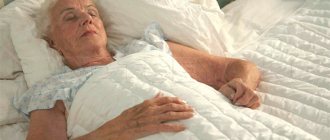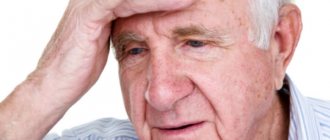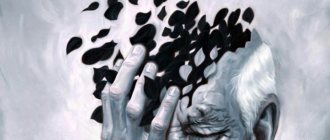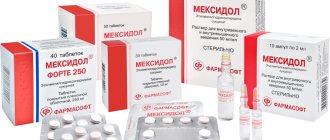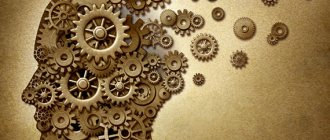Dementia is a serious disease that causes irreversible consequences. In 60-70% of cases it is a consequence of Alzheimer's disease. Those suffering from dementia lose memory, the ability to perform everyday activities, communication skills, and logical thinking. Women over 65 years of age are most susceptible to the disease. However, with a combination of unfavorable factors (alcoholism, the presence of chronic cardiovascular pathologies), men also suffer from dementia.
Since the disorder is progressive, it is especially important to identify it and begin treatment as early as possible. In most cases, timely preventive measures and a friendly atmosphere can reduce stress in elderly patients and increase the chances of reversing most of the negative consequences.
Identifying the disorder in its early stages is not easy, but it is possible. To do this, you need to know the specific signs inherent in each stage of dementia. By comparing them with each other, you can take timely measures to prevent its further progression and give your loved one the opportunity to spend old age maintaining mental health.
Stages of dementia development
Dementia tends to progress. Experts identify the following stages of dementia in the elderly:
- Easy. The duration of the stage is 3 years from the moment the first symptoms appear. Practical skills and abilities are not affected. There are learning difficulties and memory lapses. However, the patient is able to care for himself independently.
- Moderate. Lasts up to 2.5 years. Loss of acquired life skills begins to occur. Mental abilities become dull. Classic household manipulations cause difficulties. The patient needs the care of loved ones.
- Heavy. The duration of the period is up to 3.5-5 years. The last stage of dementia is caused by the breakdown of personality. A person is not able to live without outside help.
It is impossible to determine exactly how long the stages last. The course of the disease is individual. It is important to notice the manifestation of dementia in time and organize proper care for a patient with dementia. This will slow down the progression of the disease. Full recovery is impossible.
A test that can help detect dementia
If, even after detecting more than half of the accompanying signs of the disease, you doubt that your loved one is developing a serious pathology, ask him to complete a simple task. The MiniCog test makes it possible to detect dementia in its early stages with a high degree of probability.
- Ask your loved one to remember 3 words you suggested. They should not be related to each other in meaning - for example, a tablecloth, a dump truck, a feather.
- Ask the person to draw a round clock face from memory and indicate all the numbers and hands on it. At the same time, set a specific time - for example, 4:30.
- After he completes the second task, ask him what 3 words you asked him to remember.
A healthy person can easily complete the task. People with dementia make mistakes early in the development of the disorder. Thus, numbers are often arranged in a mirror manner, unnecessary numbers are added (after 12 they put 13, 14, etc.). That is, problems are already noticeable, and they can be noticed in a timely manner.
Possible options for depicting a watch dial by patients with dementia
If your relative did poorly on the test, you should not delay contacting specialists, for example, for consultation at a boarding house for elderly people with dementia. The sooner steps are taken to control the progression of the disorder, the greater the opportunity for successful treatment.
It is worth keeping in mind that a definitive diagnosis cannot be made based on the test your loved one has taken. Such exercises can prompt you to consult a specialist to identify the disease. Only a doctor can make a diagnosis, assess the severity of the pathology and prescribe effective treatment.
Causes of dementia in the elderly
It is believed that pathologies are caused by age-related changes occurring in the body. However, provoking factors can be:
- poisoning with toxic substances (the risk increases when working in production);
- liver or kidney failure;
- problems with the functioning of a number of internal organs;
- Alzheimer's disease and vascular pathologies;
- neurological diseases;
- head injuries;
- alcohol abuse;
- atherosclerosis of cerebral vessels.
The risk of dementia increases if you do too much work with little rest. Do not overdo it with taking medications. Excessive use of medications poisons the body, which negatively affects its condition.
How to recognize dementia?
There are several types of the disorder, which differ from each other in symptoms:
- Vascular.
- Atrophic.
- Mixed.
Associated deviations may appear in different sequences. Therefore, to determine effective treatment, it is especially important to determine the specific type of this disease that your loved one is developing.
Vascular dementia
This type of disease is rapidly progressive. Its first signs will be noticeable within the first 3 months after its appearance. These include:
- inability to concentrate on some task or thought, inattention, absent-mindedness;
- loss of short-term memories;
- reluctance to communicate with others;
- anxiety and irritability, suspiciousness;
- mental degradation;
- loss of interest in life;
- drowsiness during the day and insomnia at night.
As the disease develops, it manifests itself in the following symptoms:
- memory loss, loss of long-term memories;
- distorted perception of reality (complaints about KGB surveillance are one of the most obvious signs of dementia);
- change in personal qualities (the person was kind and sympathetic, but sharply changed his attitude towards others, becoming embittered and dissatisfied);
- inability to self-care and loss of personal hygiene skills;
- motor dysfunction.
Atrophic dementia
This type of disorder is more secretive than the vascular one. Symptoms are not expressed clearly, as they are often confused with age-related changes in the body of an elderly person. Because of this, atrophic dementia can develop within 5-8 years. Among the primary signs of the disorder are the following:
- loss of short-term memory;
- confidence in one’s rightness, even if the patient’s thoughts and actions are illogical;
- inability to accept and remember new information.
As the pathology develops, it manifests itself in more visible signs:
- memory impairment;
- failure to perceive a logical chain, inability to connect clearly comparable facts;
- impaired perception of reality (hallucinations, persecution mania, etc.);
- inability to self-care and maintain hygiene skills;
- loss of the ability to express your needs;
- lack of self-control (undressing in public places, unjustified aggression towards others).
Mixed dementia
The disease develops against the background of a combination of vascular lesions of the brain and primary degenerative disorders (usually Alzheimer's disease). It includes symptoms of two types of dementia and occurs in a more complex form.
Note! Some diseases may be mistaken for dementia due to the similarity of some individual symptoms:
- depression;
- thyroid diseases;
- lack of vitamins (for example, group B, vitamin B12);
- infections;
- brain tumor.
Eliminating the signs of these disorders can significantly improve the patient's condition. However, it is important to separate them from real dementia - this can only be done by a qualified specialist.
In the absence of timely treatment, the disease can develop into a severe pathology, and it will be impossible to reduce its impact on the patient. Therefore, you should pay special attention to the health and condition of elderly relatives. This approach will allow you to maintain a high quality of life for your loved ones and provide them with a dignified old age.
Dementia treatment
Experts emphasize that treatment of dementia should only occur in a hospital setting. Self-selected methods of therapy are very dangerous; it is impossible for a non-specialist to calculate the dosage of the medicine and select it correctly. Hospitalization of a patient with dementia is the best way to care for a close relative.
A comprehensive examination of patients with dementia includes:
- the patient undergoing psychological tests;
- conversation with relatives to collect anamnesis of the disease;
- imaging diagnostic methods (CT, MRI, PET).
The doctor selects medications and determines their dosage. He explains to family how to distinguish the signs and symptoms of schizophrenia from senile dementia. Provides necessary explanations regarding the treatment regimen. Provides information about the rules of behavior with the patient. Explains the specifics of patient care. Informs about side effects from prescribed medications. The doctor also recommends periodic examinations in the hospital and at home.
The treatment regimen for dementia is selected individually; in Dr. Isaev’s Clinic there are no standard methods of treating patients. It depends on the stage of the disease, the reasons that caused it, and the general condition of the patient. For thinking disorders, some drugs are prescribed, for severe concomitant diseases of the nervous system - others.
Only round-the-clock monitoring of a person with dementia will help maintain his standard of living at a normal level. If the condition worsens, the doctor promptly adjusts the prescribed therapy regimen. Also in our clinic you can undergo treatment for apathy, which is a common accompaniment of dementia.
Sources
- WHO official website. https://www.who.int/ru/news-room/fact-sheets/detail/dementia
- Sadock B. J., Sadock V. A. (2008). "Delirium, Dementia, and Amnestic and Other Cognitive Disorders and Mental Disorders Due to a General Medical Condition." Kaplan & Sadock's concise textbook of clinical psychiatry (3rd ed.). Philadelphia: Wolters Kluwer/Lippincott Williams & Wilkins. p. 52. ISBN 978-0-7817-8746-8.
- "Dementia Fact sheet N°362". who.int. April 2012. Archived from the original on March 18, 2015. Retrieved November 28, 2014.
- Förstl H, Kurz A (1999). "Clinical features of Alzheimer's disease". European Archives of Psychiatry and Clinical Neuroscience. 249(6):288–90.
- Livingston G, Sommerlad A, Orgeta V, Costafreda SG, Huntley J, Ames D, Ballard C, Banerjee S, Burns A, Cohen-Mansfield J, Cooper C, Fox N, Gitlin LN, Howard R, Kales HC, Larson EB, Ritchie K, Rockwood K, Sampson EL, Samus Q, Schneider LS, Selbæk G, Teri L, Mukadam N. Dementia prevention, intervention, and care. Lancet. 2017 Dec 16;390(10113):2673-2734.
Signs of dementia
Regardless of what type of disease the patient has, the complex of clinical manifestations of the disease is almost the same. When you first notice signs of dementia, you must urgently consult a doctor in order to make an accurate diagnosis and draw up a treatment algorithm.
Alarm bells that the patient’s relatives should pay attention to are the following factors:
- Impairment of short-term and long-term memory. It manifests itself in the form of an inability to remember new information or reproduce the events of the past day or past years. Patients make every effort to activate their memory, but they fail.
- The patient cannot fully assimilate new information or acquire skills that he did not have before. These people lose the ability to learn, cannot remember the sequence of actions and lose touch with reality.
- Disorientation in space. A person easily gets lost in open areas; he does not remember his residential address and telephone number. Sometimes he cannot clearly answer the question what day and year it is. Such elderly people are often brought to the police by vigilant citizens. Only law enforcement agencies can figure out where an elderly person comes from and where to look for his relatives.
- There is no desire to learn something new, since this information cannot be processed by the brain at the same level.
- The critical attitude towards oneself and one’s actions is lost, the patient ceases to distinguish between what is bad and what is good. He falls into childhood, losing all the signs of an adult.
- There is no planning for the next days and months of your life. Patients with dementia live one day at a time.
The disease is getting worse every day, these manifestations are intensifying. New signs of dementia appear, even more destructive and dangerous.
Non-drug treatment methods
Non-drug methods of maintenance therapy for patients with dementia can also effectively influence the cognitive sphere. They are used simultaneously with taking medications prescribed by the attending physician.
The advantage of these methods is that they have no contraindications and are used for any type of dementia, except for the most severe stage.
What methods of restoring cognitive function are indicated for dementia:
- Cognitive training. During the training, simple fragments of poems are memorized, passages of text are read aloud, and other exercises are performed.
- Cognitive stimulation. It involves influencing different senses, and is often carried out in a group. The activity may include warm-up, simple games, singing, dramatization, riddle solving and other activities.
- Biographical training. Since long-term memory is often affected in dementia, it is helpful to repeat and reconstruct past events.
- Music therapy, art therapy. The interest of patients with dementia in the outside world fades over time, so it is important, at least during special classes, to maintain contact with the field of art, to continue education and development in a simplified form.
- Diary entries. The practice of keeping a diary is not only useful for maintaining speech function, but also allows patients to record their own emotions and experiences.
- Walking and light exercise - physical activity in any form is highly desirable.
It is important to conduct classes daily, devoting enough time to them to get a positive effect.
Second stage
The moderate stage of dementia is characterized by worsening mental disorders. Gradually, more and more oddities appear that disrupt adaptation and the usual rhythm of life. Every day it becomes more difficult for an elderly person to cope with household responsibilities, and the performance of professional skills becomes impossible. Constant external care becomes a necessity, since forgetfulness can cause a fire or other disasters.
Important! Finding out the cause of dementia can help organize the correct treatment tactics for the patient and disease prevention for his relatives.
Symptoms
The second stage of dementia is characterized by the addition of the following clinical signs:
- account disorder, due to which financial transactions and payments in the store are difficult;
- names of objects and important things (own phone number, address) are forgotten;
- the patient forgets the names of his grandchildren, the name of the educational institution where he spent his years of study;
- orientation in familiar areas is impaired, so the likelihood of getting lost increases;
- there is a tendency to wander aimlessly, the gaze is often absent and directed at one point;
- the patient ceases to navigate the time of day, understand the clock, and does not distinguish between seasons;
- problems arise when dressing, and subsequently the ability to dress independently is lost;
- the patient does not remember how to prepare food, forgets to eat on time.
Professional skills are completely lost, and therefore working pensioners are forced to leave their jobs. At the second stage of senile dementia, the patient needs constant outside care, since he is completely dependent on others.
If psychotic symptoms appear (delusions, obsessions, hallucinations), observation by a psychiatrist is necessary. Senile psychosis at this stage is characterized by the appearance of delusional ideas of causing damage and robbery. Often, relatives have to start searching for lost things or money that an elderly person hid from potential robbers.
How is it diagnosed?
A diagnosis of the second stage of the disease can be made based on clinical symptoms and additional examination methods. Biochemical indicators often show an increase in cholesterol and blood sugar levels.
Changes in brain tissue are diagnosed using positron emission tomography and magnetic resonance imaging. Analysis of cerebrospinal fluid allows the inclusion of specific pathological tau protein, which indicates the progression of Alzheimer's disease.
Pathological changes in brain tissue
With the help of modern diagnostic methods, it becomes possible to detect areas of destruction in the brain tissue. In Alzheimer's disease, foci of degeneration first appear in the cerebral cortex, and in the second stage, the subcortical areas of the brain are also destroyed.
Foci of necrosis (cerebral infarction) appear at the second stage of development of vascular dementia and the prognosis of life expectancy depends on the rate of progression of atherosclerosis of cerebral vessels and hypertension. Often at this stage the patient dies from an ischemic stroke, which can develop due to increased blood clotting and a jump in blood pressure.
Treatment methods
Continued treatment is indicated to slow the rate of progression of Alzheimer's disease. Anti-sclerotic and vascular drugs improve blood supply to the brain; acetylsalicylic acid helps make the blood more fluid, reduce its viscosity and prevent thrombosis.
The aggressive stage of dementia with the addition of delusions and hallucinations requires the prescription of antipsychotic drugs from the group of neuroleptics.
In cases of severe mental and motor agitation, the use of tranquilizers is indicated. Medicines for the second stage of dementia
| Group of drugs | Name of drugs | Features of application |
| Neuroleptics | Tizercin, Triftazin, Haloperidol | When delusions and hallucinations occur |
| Tranquilizers | Sibazon, Relanium | With motor and mental excitement |
| Antisclerotic | Rosuvastatin | When cholesterol levels rise |
| Improves memory | Memantine, Dopenesil | Continuous reception |
| Vascular | Cavinton, Pentoxifylline | Course treatment |
Treatment is accompanied by monitoring of biochemical blood parameters and clinical manifestations of the disease. The treatment regimen and dosage can be adjusted depending on the individual characteristics of the patient.
Important! Biorhythm disturbances cause disturbances in night sleep, so the prescription of sleeping pills is justified.
Behavior Changes
Some patients may experience sexual disinhibition. Memory lapses lead to disorientation, so patients imagine themselves as small children or teenagers, and mistake their children for their parents. An elderly person may get lost while walking because he does not remember the way home or his address. The situation becomes more complicated when the lost person cannot give his passport details. Walks (even close to home) should only be accompanied by relatives or medical personnel.
Behavioral changes are especially pronounced in the moderate stage of dementia, and the prognosis for life expectancy depends on how quickly this stage of the disease progresses. Aggressiveness and suspicion often make life unbearable for family members and force them to send a relative to a specialized boarding school.
Prevention of dementia: how to prevent the development of the syndrome
Unfortunately, it is impossible to completely protect yourself from cognitive impairment: they are often provoked by unpredictable and not fully explained by science pathologies (which include, for example, Alzheimer's disease).
However, several areas of dementia prevention are recognized worldwide. They are effective because approximately 35% of dementia is due to modifiable risk factors. By eliminating these factors in advance, you can reduce the risk of cognitive impairment in old age.
What preventive measures are the most effective and important:
- Physical activity. It is physical education that today is considered the basis of prevention, since it has a complex effect on the body and prevents direct and indirect risk factors. It is important to systematically engage in physical activity throughout your life or start as early as possible before cognitive function begins to decline. Intense training brings particular benefits to the brain, but if there are contraindications for it, do it to the best of your ability, appropriate for your age. Physical exercise not only affects the psychological state of a healthy person in the present, but also protects nerve cells and can prevent intellectual decline in the future.
- Maintaining body weight within normal limits. Obesity, and as a result vascular diseases and diabetes, are serious risk factors that are best avoided.
- Treatment of arterial hypertension. If this disease is detected at an early age, it is important not to let it take its course and be registered with a cardiologist. The goal of this area of prevention is to restore the health of the cardiovascular system before disruptions in its functioning provoke irreversible damage to brain cells.
- Mental activity and multi-stage education. To ensure that cognitive functions do not suffer in old age, it is important to give the brain sufficient and constant load. It has been proven that people who only completed primary school and stopped studying at age 11–12 have a one and a half times higher risk of cognitive impairment. At the same time, complete secondary or higher education significantly reduces the likelihood of developing dementia.
- Quitting smoking and drinking alcohol. Destruction of brain cells under the influence of ethyl alcohol or nicotine is one of the indirect causes of dementia, which should be excluded in advance.
- Active social life. Lack of social interaction and voluntary isolation at an early age may also be risk factors. Therefore, it is important to maintain a sufficient number of contacts with colleagues, friends and loved ones.
- A healthy diet, which must include fruits, vegetables and fish, and it is better to reduce the percentage of meat and dairy products. This is the so-called Mediterranean-type diet, which has a beneficial effect on the condition of blood vessels and the body as a whole.
Dementia treatment in Moscow reviews
When choosing a clinic for the treatment of dementia, many relatives of patients are afraid of poor-quality care or cruel treatment of a mentally retarded person. The fears are based on information about old-style state mental hospitals, the conditions of which did not stand up to criticism. On this page you will see reviews from our patients and their loved ones who have already undergone treatment for dementia. Their words will be the best confirmation of comfortable living conditions, good nutrition and proven methods of therapy for older people.
Prevention of acquired dementia
We can eliminate the above-mentioned 9 factors of dementia if we adhere to a healthy lifestyle. Let's look at key recommendations for maintaining mental health and minimizing the risk of dementia.
A balanced diet with plenty of vegetables, berries, and fruits helps prevent dementia. Photo: rawpixel.com / freepik.com
Stay physically active
This is the most important aspect of a healthy lifestyle. WHO experts recommend a minimum of 150 minutes of physical activity per week. It is best to divide this time into 30 minutes 5 times a week. This could be walking at a medium or fast pace, swimming or playing sports such as tennis.
It is important that you sweat and breathe quickly during exercise. This is how physical exercise hypoxia is achieved, when the body lacks oxygen and is forced to increase the heart rate to increase blood circulation. Such dosed exercises are very useful, including for brain function.
Quit smoking
It's never too late to quit smoking. But the sooner you do this, the better. This also applies to passive smoking. Stay away from cigarette smoke. Demand that your loved ones go out to smoke on the balcony or outside. Smoking negatively affects the condition of blood vessels, which increases the risk of vascular dementia.
Eat healthy
A balanced diet is another preventative component against dementia. Eat at least 500 grams of vegetables, fruits and berries every day. Raw plant foods are valuable in dietary fiber, which is not digested, but has a beneficial effect on intestinal function, and also binds sugar, allowing you to keep blood glucose normal.
Eat fish at least twice a week. Fatty sea fish is especially useful. It contains a lot of polyunsaturated fatty acids, which are very beneficial for blood vessels and nervous tissue.
It is best to keep red meat consumption to a minimum. More and more studies are coming out showing that as we age, the consumption of meat and meat products should be reduced in favor of plant foods or fish.
Maintain a normal weight
This is important from the point of view of preventing type 2 diabetes. Just like smoking, it’s never too late to start fighting excess weight. Even if you have already been diagnosed with diabetes, this does not mean that all is lost. Regular exercise and diet will lower your sugar levels and reduce your dependence on glucose-lowering medications.
Stay mentally active
Just like the body, the brain needs constant training. Try to read books, practice foreign languages and engage in mental work throughout your life. It is desirable that these are complex tasks. It's important to get your brain working. In this sense, learning a foreign language, playing musical instruments, learning poetry by heart and other intellectual work are great.
Symptoms
The main symptoms of dementia occur in all forms and types of the disease. They include:
- decreased short-term memory;
- difficulty in perceiving new information, learning new skills (for example, working with a computer or smartphone);
- viscosity of thinking: the patient takes a long time to think, he needs more time to solve any problems or issues;
- speech difficulties: slurred pronunciation, difficulty finding words;
- impaired coordination of movements, especially fine motor skills;
- uncertainty, unsteadiness of gait;
- inappropriate behavior: patients become overly sweet or, conversely, aggressive;
- disorientation in space and time.
Different types of dementia have their own characteristic symptoms. For example, the Alzheimer's type is manifested mainly by mental and memory disorders, changes in thinking, and inappropriate behavior. The vascular form of the disease is characterized by both intellectual and motor impairments, and dementia with Lewy bodies often takes on the character of a psychiatric pathology and is accompanied by hallucinations, delusions, insomnia and depression.
Types of dementia
Experts classify the disease into three areas. They are distinguished by the extent and selectivity of damage to the body:
- Atrophic (Alzheimer's) - occur due to malfunctions of the nervous system.
- Vascular – acts as a concomitant disease, the primary source of which is impaired blood circulation in the brain.
- Mixed - combines the features of the vascular and atrophic types.
According to statistics, atrophic type dementia is more common in older women than in men.
The classification of dementia depending on the location of the brain lesion is as follows:
- cortical - the cerebral cortex is primarily affected (Pick's disease or Alzheimer's disease);
- subcortical – pathology affects subcortical structures (Parkinson’s disease with neurological symptoms);
- cortical-subcortical – there are disturbances in both the cortex and subcortex;
- multifocal – damage to the nervous system in all parts.
There are lacunar and total dementia. In the first case, there is damage to the structures responsible for intellectual activity. A person cannot remember what happened to him 5 minutes ago, but at the same time he calmly reproduces in his memory the events of twenty years ago. His short-term memory suffers, and a number of associations are significantly impoverished. His intelligence fails, sometimes even simple things become inaccessible to understanding. The patient is critical of his condition and is aware of the problem. The emotional-volitional sphere is practically not affected; symptoms include increased sensitivity and tearfulness.
In the case of total dementia, the situation looks much more serious. This type of disease is accompanied by gross changes in the intellectual and emotional-volitional spheres. Life interests are lost irrevocably, moral values fade into the background, and there is no sense of shame for unseemly actions. Such patients cannot remain full-fledged members of society, as they are completely maladapted. Our clinic treats suicidal behavior and senile dementia using new, safe methods.
Causes of dementia at a young age
Dementia in young people is the result of illness or injury. It is possible that early onset dementia may develop at a young age due to the influence of a hereditary factor. However, such cases are quite rare. However, if there is a history of dementia in the family, it is recommended to take preventative measures and closely monitor your health after reaching 60 years of age.
The causes of dementia at a young age are:
- alcoholism. Alcohol abuse leads to vitamin B1 deficiency, which results in memory loss and difficulty in perceiving new information;
- dementia caused by thyroid dysfunction;
- dementia due to traumatic brain injury;
- infectious and viral diseases that destructively affect brain cells (AIDS, neurosyphilis, meningitis, etc.).

